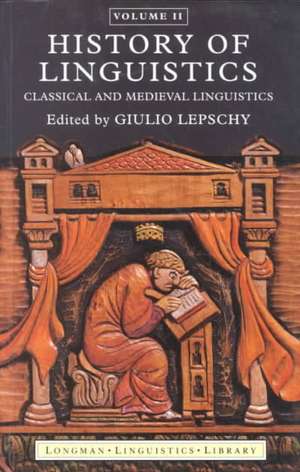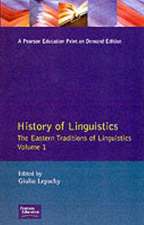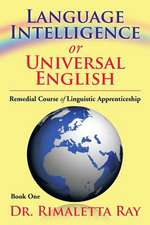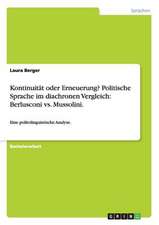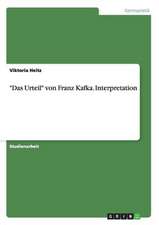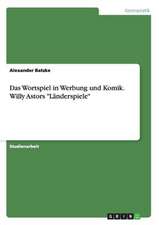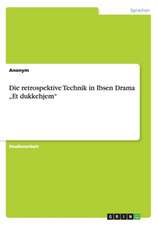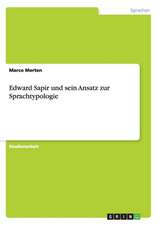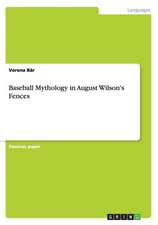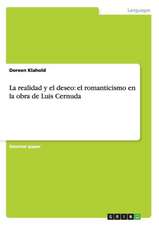History of Linguistics Volume II: Classical and Medieval Linguistics: Longman Linguistics Library
Autor Giulio C. Lepschyen Limba Engleză Paperback – 27 iun 1994
Volume Two examines the Greek, Roman and Medieval European traditions, which between them developed the grammatical and syntactical models which form the basis of our inherited linguistic assumptions.
| Toate formatele și edițiile | Preț | Express |
|---|---|---|
| Paperback (1) | 556.82 lei 6-8 săpt. | |
| Taylor & Francis – 27 iun 1994 | 556.82 lei 6-8 săpt. | |
| Hardback (1) | 771.05 lei 6-8 săpt. | |
| Taylor & Francis – 23 feb 2017 | 771.05 lei 6-8 săpt. |
Din seria Longman Linguistics Library
- 8%
 Preț: 418.19 lei
Preț: 418.19 lei - 15%
 Preț: 531.78 lei
Preț: 531.78 lei - 15%
 Preț: 479.40 lei
Preț: 479.40 lei - 15%
 Preț: 676.07 lei
Preț: 676.07 lei - 15%
 Preț: 658.07 lei
Preț: 658.07 lei -
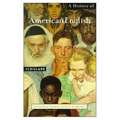 Preț: 479.42 lei
Preț: 479.42 lei -
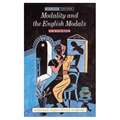 Preț: 478.46 lei
Preț: 478.46 lei - 15%
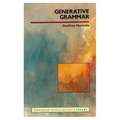 Preț: 558.74 lei
Preț: 558.74 lei - 18%
 Preț: 980.00 lei
Preț: 980.00 lei - 18%
 Preț: 874.84 lei
Preț: 874.84 lei -
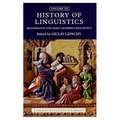 Preț: 479.42 lei
Preț: 479.42 lei - 15%
 Preț: 413.76 lei
Preț: 413.76 lei -
 Preț: 475.64 lei
Preț: 475.64 lei - 18%
 Preț: 980.00 lei
Preț: 980.00 lei - 18%
 Preț: 980.00 lei
Preț: 980.00 lei - 15%
 Preț: 463.29 lei
Preț: 463.29 lei - 15%
 Preț: 656.40 lei
Preț: 656.40 lei -
 Preț: 282.93 lei
Preț: 282.93 lei - 18%
 Preț: 980.00 lei
Preț: 980.00 lei -
 Preț: 468.38 lei
Preț: 468.38 lei -
 Preț: 479.42 lei
Preț: 479.42 lei - 18%
 Preț: 1193.38 lei
Preț: 1193.38 lei - 26%
 Preț: 1013.16 lei
Preț: 1013.16 lei - 15%
 Preț: 551.19 lei
Preț: 551.19 lei - 15%
 Preț: 455.73 lei
Preț: 455.73 lei -
 Preț: 471.21 lei
Preț: 471.21 lei -
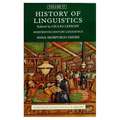 Preț: 482.24 lei
Preț: 482.24 lei -
 Preț: 479.42 lei
Preț: 479.42 lei - 8%
 Preț: 383.06 lei
Preț: 383.06 lei
Preț: 556.82 lei
Preț vechi: 655.07 lei
-15% Nou
Puncte Express: 835
Preț estimativ în valută:
106.56€ • 110.69$ • 88.52£
106.56€ • 110.69$ • 88.52£
Carte tipărită la comandă
Livrare economică 03-17 februarie 25
Preluare comenzi: 021 569.72.76
Specificații
ISBN-13: 9780582094918
ISBN-10: 0582094917
Pagini: 400
Dimensiuni: 138 x 216 x 22 mm
Greutate: 0.45 kg
Ediția:1
Editura: Taylor & Francis
Colecția Routledge
Seria Longman Linguistics Library
Locul publicării:Oxford, United Kingdom
ISBN-10: 0582094917
Pagini: 400
Dimensiuni: 138 x 216 x 22 mm
Greutate: 0.45 kg
Ediția:1
Editura: Taylor & Francis
Colecția Routledge
Seria Longman Linguistics Library
Locul publicării:Oxford, United Kingdom
Cuprins
Introduction
Acknowledgements
Notes on the contributors
1. Greek and Latin linguistics, Peter Matthews
1.1 Introduction
1.2 Phonetics and phonology
1.3 The status and origin of words
1.4 Elements of the sentence
1.5 The prehistory of grammar
1.6 Grammars under the Empire
2. Medieval linguistics, Edoardo Vineis and Alfonso Maierù
2.1 Introduction, Edoardo Vineis
2.2 Linguistics and grammar, Edoardo Vineis
2.2.1 Schools and centres of culture from Late Antiquity to the Carolingian Renaissance
2.2.2 Schools and centres of culture from the Carolingian Renaissance to the threshold of Humanism
2.2.3 Knowledge of the Latin grammarians in the various areas of Europe
2.2.4 Boethius, Cassiodorus, and Isidore of Seville
2.2.5 Iulianus Toletanus and the beginnings of the early medieval grammatical tradition up to the works of Virgil the grammarian
2.2.6 'Elementary grammarians' and 'exegetic grammars' up to the Carolingian Renaissance
2.2.7 The tenth-twelfth century commentaries on Donatus and Priscian: first indications of the appearance of a speculative grammar
2.2.8 Doctrinale and the Grecismus
2.2.9 Lexiographic activity
2.2.10 Grammars for the teaching of Latin written in other languages: the example of Aelfric
2.2.11 The grammatical description of other languages other than Latin
2.2.12 Elements of synchronic descriptions of the different local pronunciations of Latin inferable from medieval Latin grammars
2.3 The philosophy of language, Alfonso Maierù
2.3.1 Platonism in the early Middle Ages
2.3.2 Aristotelianism in the eleventh and twelfth centuries
2.3.3 The grammar of the Modistae
2.3.4 Critics of the Modistae
Notes
Bibliographical references
Index
Acknowledgements
Notes on the contributors
1. Greek and Latin linguistics, Peter Matthews
1.1 Introduction
1.2 Phonetics and phonology
1.3 The status and origin of words
1.4 Elements of the sentence
1.5 The prehistory of grammar
1.6 Grammars under the Empire
2. Medieval linguistics, Edoardo Vineis and Alfonso Maierù
2.1 Introduction, Edoardo Vineis
2.2 Linguistics and grammar, Edoardo Vineis
2.2.1 Schools and centres of culture from Late Antiquity to the Carolingian Renaissance
2.2.2 Schools and centres of culture from the Carolingian Renaissance to the threshold of Humanism
2.2.3 Knowledge of the Latin grammarians in the various areas of Europe
2.2.4 Boethius, Cassiodorus, and Isidore of Seville
2.2.5 Iulianus Toletanus and the beginnings of the early medieval grammatical tradition up to the works of Virgil the grammarian
2.2.6 'Elementary grammarians' and 'exegetic grammars' up to the Carolingian Renaissance
2.2.7 The tenth-twelfth century commentaries on Donatus and Priscian: first indications of the appearance of a speculative grammar
2.2.8 Doctrinale and the Grecismus
2.2.9 Lexiographic activity
2.2.10 Grammars for the teaching of Latin written in other languages: the example of Aelfric
2.2.11 The grammatical description of other languages other than Latin
2.2.12 Elements of synchronic descriptions of the different local pronunciations of Latin inferable from medieval Latin grammars
2.3 The philosophy of language, Alfonso Maierù
2.3.1 Platonism in the early Middle Ages
2.3.2 Aristotelianism in the eleventh and twelfth centuries
2.3.3 The grammar of the Modistae
2.3.4 Critics of the Modistae
Notes
Bibliographical references
Index
